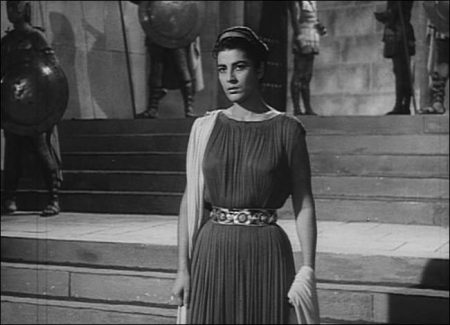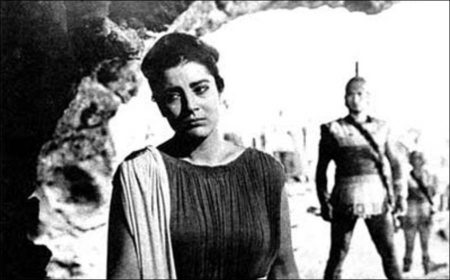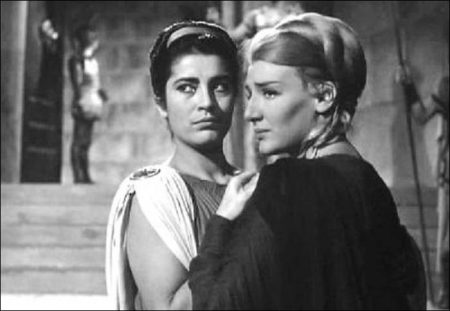
Antigone movie storyline. In the Ancient Greek city of Thebes, King Oedipus killed his father and married his mother Jocasta, having two sons – Eteocles and Polynieces – and two daughters – Ismene and Antigone. King Oedipus died a beggar in the exile after gouging out his own eyes, and Eteocles agreed to reign in Thebes in alternating years with Polynieces. However, Eteocles refuses to resign after the first year and Polynieces is exiled. Polynieces raises an army and attacks Thebes, and the two brothers kill each other.
Crean, the new ruler of Thebes Creon decrees that Eteocles should have an honorable burial while the body of the traitor Polynieces should be left on the battlefield to be eaten by jackals and vultures. However, Antigone, who was betrothed to Creon’s surviving son Haemon, defies Creon’s orders and buries her brother. When Creon is reported of the attitude of Antigone, he sentences her to be sealed in a tomb alive. Antigone hangs herself in the tomb and Haemon tries to kill his father first and then he kills himself with his sword. When Creon’s wife Eurydice is informed of the death of her son, she also commits suicide, leaving Creon alone.
Antigone (Greek: Aντιγόνη, Antigone) is a 1961 Greek film adaptation of the Ancient Greek tragedy Antigone by Sophocles. It stars Irene Papas in the title role and was directed by Yorgos Javellas. The film follows the story of the play closely, but ends differently–instead of Creon retiring back to the palace as in the play, the film ends with Creon relinquishing his kingship and exiling himself out of Thebes. It was entered into the 11th Berlin International Film Festival.

Antigone Introduction
Welcome to Thebes, Shmoopers. The population of this city is pretty uniformly doomed—when they’re not sleeping with their own mothers (lookin’ at you, Oedipus) or acting all high and mighty and assuming that their law is better than the gods’ (cough, Creon, cough cough), they’re burying their brother when burying their brother is forbidden—c’mon, Antigone; we’ve been over this.
Antigone is the third volume in what is maybe the most messed up Greek tragic trilogy of all time: Oedipus the King, Oedipus at Colonus, and Antigone. These plays follow the fall of the great king, Oedipus, and later the tragedies that his children suffer. (Oedipus keeps it in the family—nudge, nudge.)
The Oedipus plays are awesome for a number of reasons: they’re gory, they’re tragic, and they’re bound to make even the most aggressively cheerful theatergoer depressed. But they’d also have had a wide-reaching influence (and are particularly notable for inspiring Sigmund Freud’s theory of the “Oedipus Complex,” or the “kill-the-father-sleep-with-the-mother complex”).
Antigone, which comes last chronologically, was the play Sophocles wrote first, around 440 B.C—yup, this play actually came before Oedipus the King and Oedipus at Colonus. And it has all the hallmarks of an ambitious young author’s work: namely, some serious verve and intensity.
So what goes down in Antigone’s Thebes? Short answer: nothing good. Long answer: Big King Creon decides that nobody gets to bury the body of the traitor Polyneices. Polyneices just has to rot out in the open… which is both a) not very sanitary and b) in direct opposition with religious doctrine. But rebel-with-a-cause (the cause is “bury my brother”) Antigone decides to do a bit of grave-digging, even if gets her landed in jail.
Creon is none too happy with this, and so decides to entomb her while she’s still alive. Bad call, C: Antigone hangs herself, Creon’s son Haemon kills himself, and Creon’s wife/ Haemon’s mama also decides to shuffle off her mortal coil.
Thebes: The Unhappiest Place On Earth. We won’t be booking a vacation there anytime soon. But if you’re itching for a hair-rending, crazy-tragic, feel-bad story you pretty much can’t do better than Antigone. Or should we say you can’t do worse?
<
h4>Antigone (1962)
Directed by: Yorgos Javellas
Starring: Irene Papas, Manos Katrakis, Maro Kodou, Nikos Kazis, Ilia Livykou, Giannis Argyris, Giorgos Vlahopoulos, Byron Pallis, Tzavalas Karousos, Thodoros Moridis, Yorgos Karetas, Thanasis Kefalopoulos
Screenplay by: Yorgos Javellas
Production Design by: Hans Hurch
Cinematography by: Dinos Katsouridis
Film Editing by: Giorgos Tsaoulis
Costume Design by: Giorgos Anemogiannis
Set Decoration by: Giorgos Anemogiannis
Art Direction by: Giorgos Anemogiannis
Music by: Arghyris Kounadis
MPAA Rating: None.
Distributed by: Ellis Films (USA) (theatrical) (subtitled)
Release Date: September 18, 1962 (New York City, New York)
Views: 246









